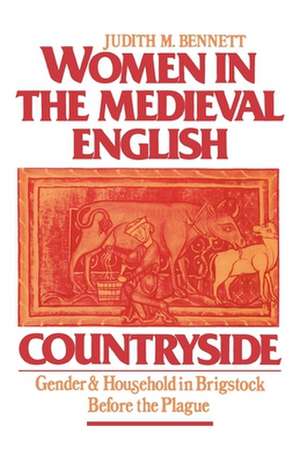Women in the Medieval English Countryside: Gender and Household in Brigstock Before the Plague
Autor Judith M. Bennetten Limba Engleză Paperback – sep 1989
| Toate formatele și edițiile | Preț | Express |
|---|---|---|
| Paperback (1) | 687.04 lei 6-8 săpt. | |
| OXFORD UNIV PR – sep 1989 | 687.04 lei 6-8 săpt. | |
| Hardback (1) | 269.14 lei 31-37 zile | |
| Oxford University Press – 14 mai 1987 | 269.14 lei 31-37 zile |
Preț: 687.04 lei
Preț vechi: 892.25 lei
-23% Nou
Puncte Express: 1031
Preț estimativ în valută:
131.46€ • 143.25$ • 110.78£
131.46€ • 143.25$ • 110.78£
Carte tipărită la comandă
Livrare economică 23 aprilie-07 mai
Preluare comenzi: 021 569.72.76
Specificații
ISBN-13: 9780195045611
ISBN-10: 0195045610
Pagini: 338
Ilustrații: tables
Dimensiuni: 139 x 211 x 18 mm
Greutate: 0.39 kg
Ediția:Revised
Editura: OXFORD UNIV PR
Locul publicării:New York, United States
ISBN-10: 0195045610
Pagini: 338
Ilustrații: tables
Dimensiuni: 139 x 211 x 18 mm
Greutate: 0.39 kg
Ediția:Revised
Editura: OXFORD UNIV PR
Locul publicării:New York, United States
Descriere
In this book, Judith Bennett addresses the gap in our knowledge of medieval country women by examining how their lives differed from those of rural men. Drawing on her study of an English manor in the early fourteenth century, she finds that rural women were severely restricted in their public roles and rights primarily because of their household status as dependents of their husbands, rather than because of a notion of female inferiority. Adolescent women andwidows, by virtue of their unmarried status, enjoyed greater legal and public freedom than their married counterparts.
Recenzii
`The analysis is sensitive, and the judgements sensible ... we can appreciate the useful contribution that this book makes to the history both of women and of medieval society' Christopher Dyer, History
'meticulously researched and elegantly argued book'Merry E. Wiesner, University of Wisconsin-Milwaukee, Social History
'meticulously researched and elegantly argued book'Merry E. Wiesner, University of Wisconsin-Milwaukee, Social History






